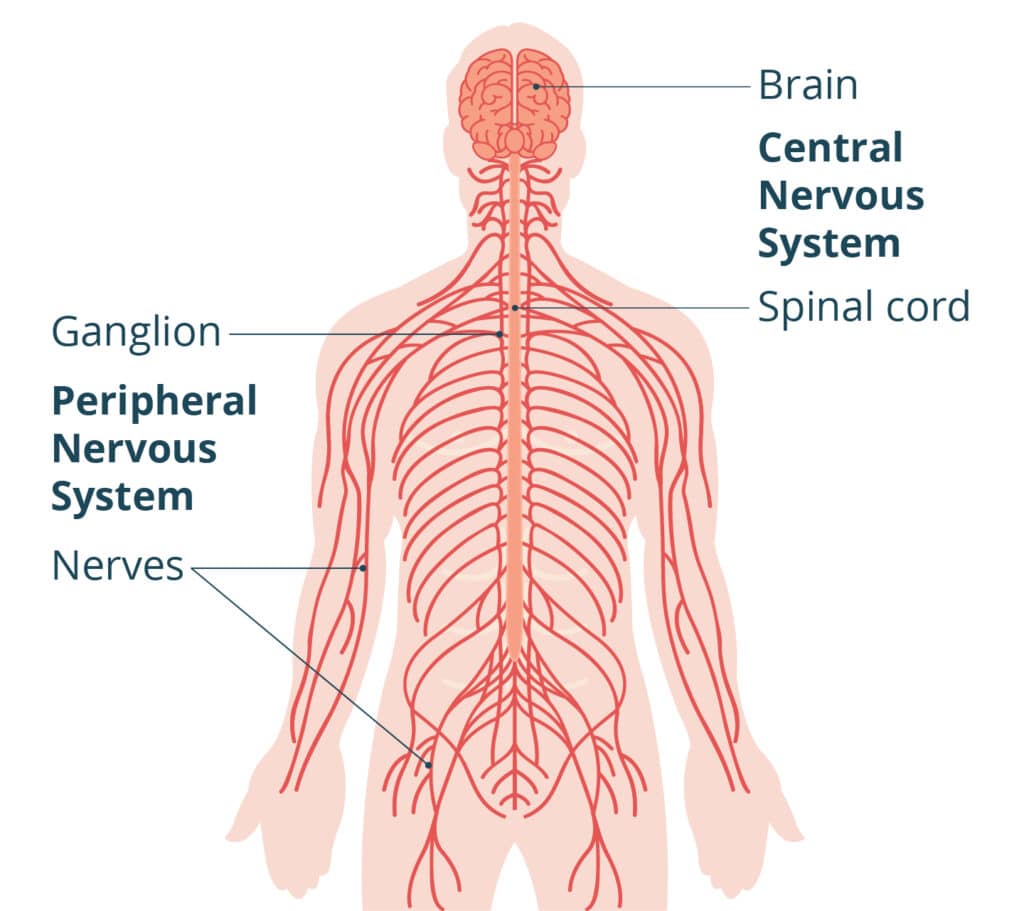The central nervous system (CNS) is a complex network of nerves and cells that includes the brain and spinal cord. It serves as the command center of the body, coordinating and controlling all voluntary and involuntary actions, as well as processing sensory information from the environment.
The brain, the most vital organ of the CNS, is responsible for higher cognitive functions such as thinking, memory, emotion, and consciousness. It is divided into different regions, each with specialized functions. For example, the cerebral cortex is involved in decision-making and sensory perception, the cerebellum controls movement and balance, the limbic system regulates emotions and memory, and the brainstem controls basic life functions such as breathing and heart rate.
The spinal cord, a long, tubular structure that runs from the base of the brain to the lower back, acts as a relay system between the brain and the rest of the body. It serves as a pathway for transmitting nerve signals to and from the brain, allowing for voluntary movements, reflex actions, and sensory perception.
Disorders affecting the central nervous system can have profound effects on cognitive function, motor control, sensory perception, and overall well-being. These disorders can arise from various causes, including genetic mutations, infections, traumatic injuries, autoimmune responses, degenerative changes, and metabolic imbalances.
Neurological disorders, such as Alzheimer’s disease, Parkinson’s disease, multiple sclerosis, epilepsy, and stroke, are among the most common disorders affecting the central nervous system. These conditions can lead to a wide range of symptoms, including memory loss, movement disorders, seizures, sensory deficits, and cognitive impairments.
Traumatic injuries to the CNS, such as traumatic brain injury (TBI) and spinal cord injury (SCI), can result in significant functional impairments and disabilities. Depending on the severity and location of the injury, individuals may experience paralysis, loss of sensation, difficulties with speech or cognition, and changes in mood or behavior.
Infections of the CNS, such as meningitis, encephalitis, and brain abscesses, can cause inflammation and tissue damage, leading to symptoms such as headache, fever, altered mental status, and neurological deficits. Prompt diagnosis and treatment with antibiotics or antiviral medications are essential for preventing complications and minimizing long-term damage.
Autoimmune disorders affecting the CNS, such as multiple sclerosis (MS) and neuromyelitis optica (NMO), involve the immune system mistakenly attacking the myelin sheath, the protective covering of nerve fibers in the brain and spinal cord. This results in demyelination and disruption of nerve signals, leading to symptoms such as weakness, numbness, visual disturbances, and difficulties with coordination and balance.
Degenerative disorders of the CNS, such as Alzheimer’s disease, Parkinson’s disease, and amyotrophic lateral sclerosis (ALS), involve progressive loss of nerve cells and brain tissue, leading to gradual decline in cognitive function, motor control, and overall function. Management of degenerative CNS disorders typically focuses on symptom management, supportive care, and strategies to slow disease progression and improve quality of life.
Overall, maintaining CNS health requires a holistic approach that includes preventive measures, early detection and treatment of disorders, rehabilitation and supportive care, and ongoing management of symptoms and complications. By promoting awareness, education, and access to comprehensive neurological care, it is possible to improve outcomes and enhance the quality of life for individuals affected by CNS disorders.









